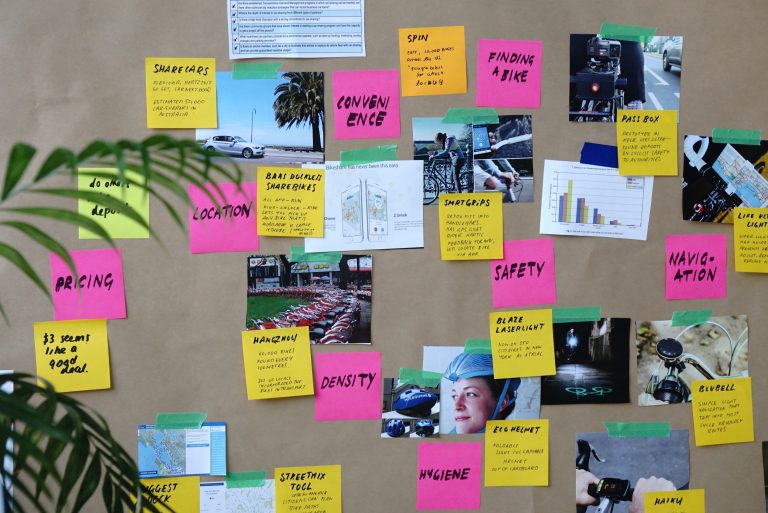Most of the time in marketing, we’re on the spot with our thinking. Whether it is a new client, a new campaign, or a new product, we need to come up with ideas on the fly. This is where these brainstorming techniques come in.
Brainstorming is a great way to get new and unique ideas. It helps to get everyone involved, and it comes in many different forms. While brainstorming can help you get the ball rolling, if you have a mind blank you may have to go back to the drawing board. The good news is that there are many different brainstorming techniques to spur your thinking.
The Basics of Brainstorming

Let’s say you’re stuck on brainstorming a topic. Where do you start? How do you get people to start thinking? Brainstorming is a technique used to generate new ideas, solutions, and possibilities.
Brainstorming is used a lot in the corporate world, but it’s also used in personal and educational settings. There are many benefits to brainstorming depending on the setting it is used in. For example, group brainstorming sessions are used in schools to introduce new topics, or used in the business world to think of solutions to problems.
The purpose of brainstorming is to bring together diverse perspectives to explore a topic or problem. It is common to use a neutral facilitator to encourage free association and creativity by the participants, who may decry a brainstorm as a wild idea session. The original purpose of brainstorming was to generate ideas on how to increase sales.
This method was described in two articles by Alex F. Osborn in the November 1952 edition of the Journal of Advertising Research and the February 1953 edition of the same journal under the title “Brainstorming – How to Generate Ideas.”
The 13 Brainstorming Techniques

The Six Thinking Hats
Thinking Hats is a great technique that can get your creative juices flowing. Just imagine a Mad Hatter’s tea party. There are a range of colors of hats, most of which hold the thoughts and ideas of individuals.
It’s a way to get used to the dynamics of conversations so that you can open up in a constructive manner. The White Hat focuses on the facts, the Red Hat focuses on emotions, the Black Hat focuses on negativity, the Yellow Hat focuses on optimism, and the Green Hat focuses on solutions.
Word Association
Word association is a technique where you associate every word or phrase on your list with another word or phrase that comes to mind. While brainstorming, you may feel that you have generated enough ideas, but don’t be fooled!
The number of ideas you have is not the true measure of how many are available to you. This technique helps you uncover new ideas that you may have missed if you had been thinking about the problem in a linear way.
Brainwriting
Brain writing is done through an iterative process. It begins with one writer writing a few concepts down, then another writer adds more, and then another. The process ends when there is a general consensus on what has been written down.
Mind Mapping
Mind mapping is the best brainstorming technique to use. The main reason is that it allows you to see your topic in different ways. You can organize notes, make diagrams on the main idea and color code your writing. Plus, it doesn’t take long to set up or to brainstorm ideas. You can also go online and find free mind mapping templates to use.
Mind mapping techniques are used in a range of businesses from start-ups to big businesses. It’s an ideal brainstorming technique because it helps you to organize big ideas and see them in a visual way.
Plus, you can use mind maps for a topic in any subject, from brainstorming science projects in your class to creating a mind map for a website you want to build. It’s an excellent way to plan out your thoughts, especially if you’re working with a team.
Nominal Group Technique
Nominal Group Technique is a popular brainstorming technique used by many businesses and entrepreneurs. The NGT can help you turn your ideas into real profits. Here are the steps to using the NGT. First, you need to gather a group of people that you trust.
Three to five people is a good size. You then need to make sure everyone is comfortable and relaxed, since the NGT is more effective when your group isn’t stressed out. Then, take a piece of paper and draw a vertical line down the middle of it.
On the left hand side, write down your problems or ideas. On the right hand side, make a list of solutions to your problems. Then, rate your solutions from the most to least effective.
Brainstorming with Pictures
You probably have heard before that the human brain can process visuals 60,000 times faster than text. That means you can get more ideas down faster when you are drawing pictures. Plus: you can use pictures that you find on the Internet or anywhere else for inspiration.
The pictures will also be more memorable. If you use pictures that you find on the Internet, find a way to customize them so they are more relevant. Below you’ll find some drawing tools to help you draw.
The Pre-Sort
The pre-sort technique is a fast way to get all your ideas out. This will enable you to get the ball rolling and let your mind fully focus on the best ideas. Simply, write down all your ideas on the paper, no matter how silly or obvious they may be.
Yes, you could use a whiteboard or a search engine but the idea is to sort and focus on the ideas, not criticize them. Once you’ve written all your ideas down, you can begin to throw out ideas that don’t work. This technique helps get the procrastinators and non-creative types start the brainstorming process.
Categorizing
Categorizing is when you take the big idea that you want to write about and you break it down into categories. For example, you might want to write about how important exercise is for your health. So you might come up with categories like how to get started exercising, how often you should be working out, the different kinds of exercises you can do and the benefits of working out.
The Dorm Room Technique
The next brainstorming technique is a method that can be used when you’re in a place where a lot of stimuli is going on. I call it the “Dorm Room Technique”. One day when I was sitting in my dorm room, I was trying to write copy for a webpage. My roommate was watching videos., my best friend was working on his laptop, and I was trying to write.
None of this was conducive to writing. What I did was imagine that I was sitting in my own room. I turned off any distractions and sat down and started writing. I was able to write a lot of words. While this technique isn’t a major breakthrough, it’s a way to get in the zone.
Random Word Brainstorming
One good way to brainstorm is by using a random word generator. You can use sites like http://www.randomwordgenerator.net to get a bunch of random words from which you can create ideas. Make sure to write down any thoughts that pop into your head before they are lost. Some people even take notes on their cell phones while listening to music!
The 5 Whys Method
One of the most powerful brainstorming techniques out there is the 5 Whys Method. It is a simple, no-fluff method that anyone can learn in a few minutes.
When you want to find the root cause of a problem, the 5 Whys Method is a great tool to use. It helps you question why something is the way it is and then keeps asking ‘why’ until you get to the heart of the matter.
The SWOT Analysis
The SWOT Analysis is a technique that is often used in business. It works best when you go through each section to figure out the strengths, weaknesses, opportunities, and threats of your business, product, or project.
Strengths: what are your main strengths as a business, product, or project? What do you do well that others don’t?
Weaknesses: what are your weaknesses as a business, product, or project? How can you improve or better yourself?
Opportunities: what are the chances for your business, product, or project to be successful? What opportunities are there to achieve your goals? What are the chances you’ll achieve them?
Threats: what are the chances that your business, product, or project will fail? What threats are there to achieving your goals? How can you stop them?
The SOAP Method
With the SOAP Method, you’re able to complete an entire project without getting stuck and without any loss of momentum. The SOAP method has five parts: Situation, Opportunity, Action, People, and Time. It’s important to take your time when brainstorming.
Don’t do it for one five minute break in the middle of the day. Instead, dedicate your whole morning to brainstorming. This will ensure that you come up with the best ideas possible.
The next step is to create a simple list of what you came up with. Do this by dividing into categories such as “Opportunities,” “People” or “Time.” Start at the beginning of each category and move through your list.
You’ll notice some themes start to appear on your lists. These are good starting points. Write them down so they don’t get lost as you work through the remaining steps. The last step of this process is to assign these items to their respective categories.
Final Thoughts With Brainstorming Techniques
We hope you enjoyed our article on brainstorming techniques! When you need to think of a name for a new product, clothing line, or other idea, brainstorming techniques can be incredibly useful. We hope that you found these techniques helpful and that your next brainstorm is a success!



